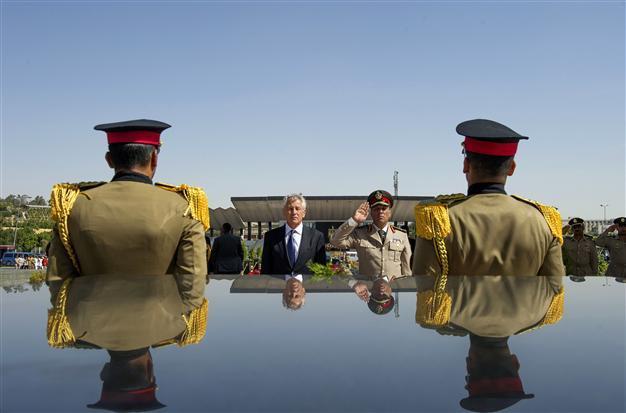US arms halt to Egypt largely 'symbolic': Analysts
CAIRO - Agence France-Presse

In this Wednesday, April 24, 2013, file photo, U.S. Secretary of Defense Chuck Hagel, second left, stands with an Egyptian army official before laying a wreath at the tomb of late President Anwar al-Sadat in Cairo. Washington?s decision to withhold millions of dollars in mostly military aid to Egypt fuels anti-U.S. AP Photo
By suspending military aid to Egypt, Washington is pressing Cairo to end the bloodshed on the streets but its largely "symbolic" act is unlikely to have a concrete impact, analysts say.They say the "half-measured" move reflects the lack of a clear US foreign policy on Egypt, where a political crisis since strongman Hosni Mubarak was toppled in 2011 has worsened after the July 3 ouster of Islamist president Mohamed Morsi.
On Wednesday, Washington suspended deliveries of major military hardware and cash assistance of $260 million to the Egyptian military, which ousted Morsi in a coup.
The decision will stop deliveries of big-ticket items such as Apache helicopters, F-16 fighters, M1A1 Abrams tank parts and Harpoon missiles.
Washington says the suspension will remain in place until Egypt moves towards an elected and "inclusive" democratic civilian government.
"The political impact of this decision is more important than the material impact on the ground," said Hassan Nafaa, professor of political science at Cairo University.
"By postponing the military aid, the US administration is putting pressure on the Egyptian adminstration to change its policy (towards supporters of Morsi) but that will not happen." Islamists and members of Morsi's Muslim Brotherhood have been the target of a brutal government campaign since a deadly August 14 assault by security forces on two pro-Morsi protest camps in Cairo.
More than 1,000 people have been killed across Egypt since then, and over 2,000 Islamists have been detained. Morsi too has been held at an unknown location since his ouster.
Washington has repeatedly called for an end to the bloodshed that has rocked Egypt since Morsi's ouster as his supporters, who reject the new military-installed interim government, regularly clash with security forces.
On Sunday, at least 57 people were killed, most of them in Cairo, when Morsi's Islamist supporters battled security forces.
Days after the August 14 crackdown, US President Barack Obama said that "our traditional cooperation cannot continue as usual when civilians are being killed in the streets." Obama had ordered his national security team to review the total $1.5 billion in annual US aid to Egypt Egypt said it would not succumb to the latest US move which came as an Egyptian court set November 4 for the start of Morsi's trial for inciting the murder of protesters outside his presidential palace last December.
"It is a flawed decision in terms of content and timing and raises serious questions over the United States' readiness to provide strategic support to Egypt's security programmes," Egypt's foreign ministry said.
Egypt, traditionally a key US ally in the Arab world, said it "will continue to take decisions regarding its domestic affairs with full independence and without foreign pressure".
US Secretary of State John Kerry tried to appease Egypt on Thursday, saying Washington's move was not a "withdrawal from our relationship" with Cairo or "severing of our serious commitment to helping the government" on the transition to democracy.
For analysts, Washington's decision is the latest example of a short-sighted policy towards Egypt with no significant impact.
"This is a short-term measure divorced from any broad strategy. There is no need to read much into it. But the fact is that this US adminstration lacks a clear foreign policy," Shadi Hamed, director of research at Brookings Doha Center, told AFP.
He said that the decision would not force Egypt's military to look elsewhere for its future arms needs as "you can't overnight overhaul your military systems." "But what it shows is that this symbolic move is adopted by a cautious US administration which has no bold measures for the Middle East. It leaves a lot of questions unanswered," Hamed added.
Hisham Kassem, an independent political analyst, said Washington's decision also showed that the United States was concerned only about Israel's security.
"Washington is sending a message that Obama is only bothered about Israel's security and not of Egypt," he said.
Kassem referred to the fact that the United States will continue to offer Cairo assistance aimed at securing Egypt's borders and for bolstering "counter-terrorism, proliferation, and security in Sinai," which neighbours Israel and Gaza.
The 1978 Camp David peace accords between Israel and Egypt have until now been a cornerstone of Washington's military aid to Egypt.
Israel had reportedly asked Washington to maintain military aid to Egypt.
"What we are seeing is a fickle short-term policy initiative. A time will come when the Americans would have to find a back door for the position they took on Egypt," said Kassem.
















